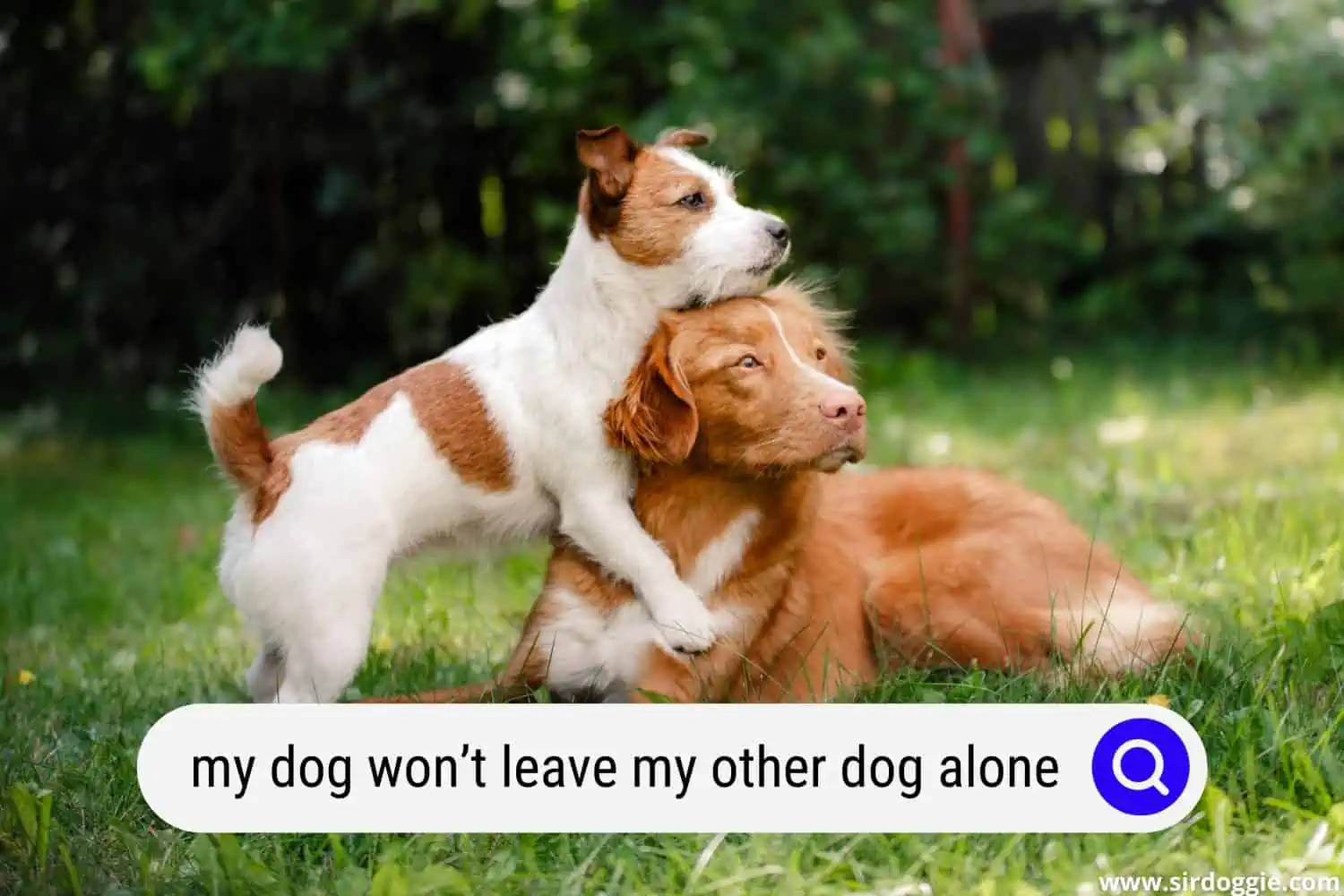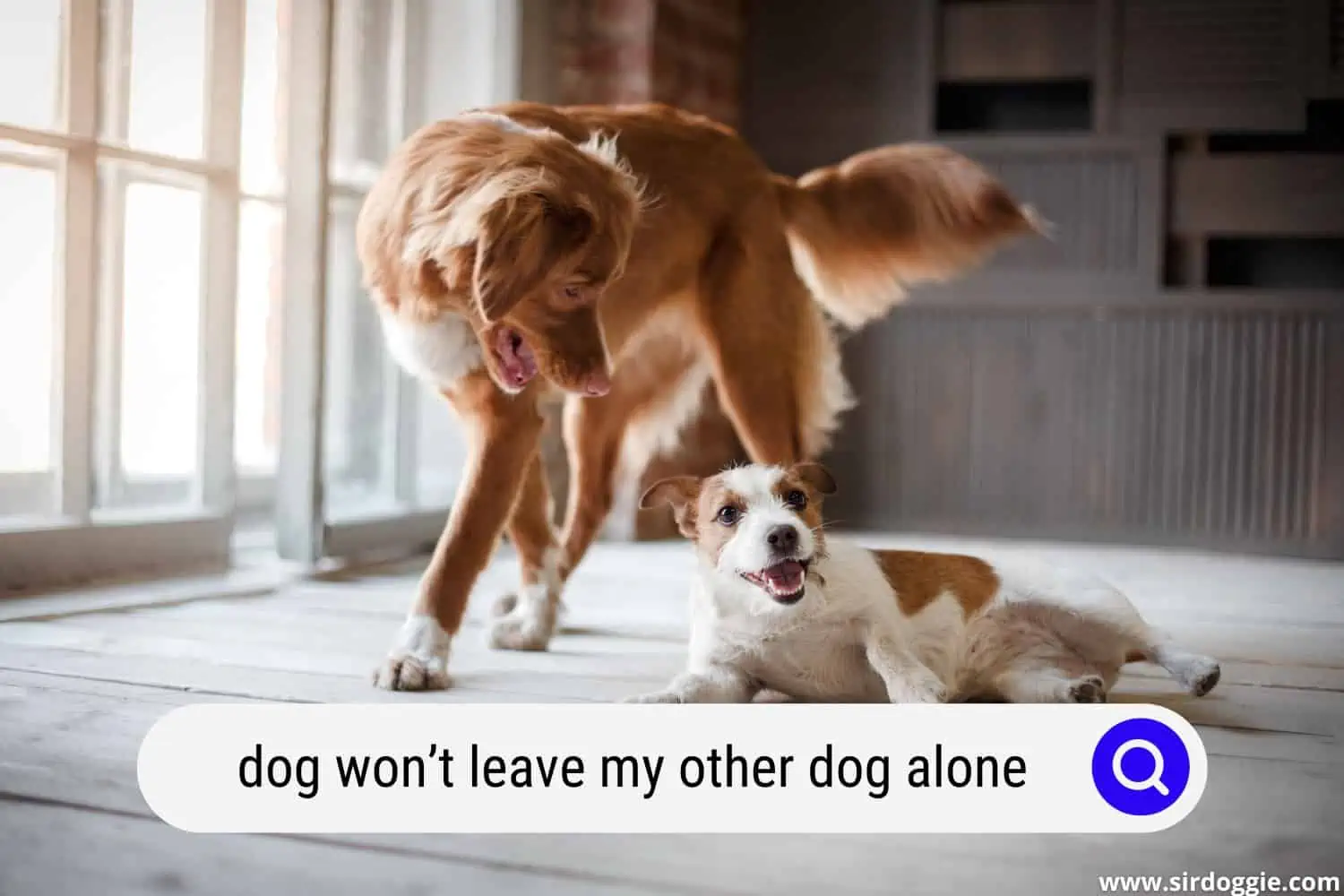Why Won’t My Dog Leave My Other Dog Alone?
Dogs make our mundane lives interesting and give us unconditional love. When you have at least two of them, the entertainment and amusement are nearly endless. Seriously, you couldn’t even pay for the displays of comedy you’ll see from them in any other setting, and they’re often funnier than any jokes you could think of writing. However, there are some situations where it isn’t so hilarious, especially when one of your dogs always bothers the other.

Many owners who experience this with their dogs often find themselves asking the question, “Why won’t my dog leave my other dog alone?” The reason most likely stems from a need to dominate or is due to some other territorial issue. Mainly, this will depend upon the temperaments and ages of the dogs involved.
There are a host of other reasons one may bother the other though, such as possessiveness, fear, or anxiety. It could also be an indicator that you’re showing favoritism or preference for one over the other.
Why Does My Dog Pick On and Bother My Other Dog?
When your dog picks on and/or bothers your other dog, this is a form of aggression. Some of the signs include, but are by no means limited to:
- Mounting
- Blocking
- Staring
- Vocalization
- Posturing
- Hovering or standing over the other dog
- Stealing toys
- Biting or attacking
If you have a rescue dog showing aggression in such ways, it may have experienced trauma at some point or wasn’t socialized as a puppy. In the case that either of your dogs suffers from separation anxiety or some other fear, they also could act out aggressively as a means of trying to control that uncertainty.
Only When You Come Home
If this behavior happens only in your presence, this aggression is likely a signal of some attention being sought from you. If this happens only when you come home, then it indicates an expression of frustration. What will compound this is if you always greet one of your dogs first or pay more attention to one than the other.
Hormonal Aggression
In other situations, the aggression could be hormonal. This would be particularly true if one of the dogs is a sexually intact male or a female in her heat cycle. Likewise, an expectant mother will exhibit aggressive behavior as well.
Household Changes
If there have been any major changes in the household, this can also bring on aggression. A new dog, a puppy’s social maturity, the declining health of an aging pet, or the loss of a canine or human family member are all possibilities for potential triggers to cause a dog to become aggressive.
Canine Social Structure
It’s important to understand that humans can’t properly conceptualize doggie social structure, and it’s not very straightforward either. One week, the case may be that one dog is the alpha, yet the next week, it’s the other’s turn. Whenever each dog takes their place as the alpha, they will display different behaviors.
Owner Behavior Can Be an Influence
Additionally, observe your own behavior. Unfortunately, many owners can inadvertently contribute to their dog’s aggression. Potential scenarios include interfering with social rituals, reinforcing aggression, frequently yelling and scolding, getting upset, and also inconsistency, lack of training, and giving preferential treatment to one dog over the other.
How Do You Stop One Dog From Bothering Another Dog?
The good news is that you can treat aggressive behavior, but you have to understand that it may take some time before you see any results depending on how bad the behavior is. Therefore, you’ll want to take a step-by-step approach.
Preliminary Considerations
If there are severe bites, fighting, and other injuries, re-homing the dog may become necessary if nothing improves after a considerable period. However, you can take comfort in the fact that curbing this kind of trouble has a 96% success rate with most methods.
Rule Out Medical Reasons
First, take your dogs to the vet to rule out any physical ailments or illnesses. If it’s a hormonal issue, the obvious solution is to get the dogs spayed or neutered. Additionally, other medical issues may require medication.
Professional Trainers and Behavioral Specialists
In cases of trauma or lack of socialization as a puppy, hiring the help of a professional dog trainer will help immensely. You may also need to seek the guidance of a dog behavioral specialist to help the dog come to terms with their past trauma.
Remove Triggers and Desensitize Your Dogs
You will also want to figure out what your dogs’ triggers are when it comes to their aggression. These can include treats, toys, resting spots, food, owner proximity, or even a need for attention. This means that you’re going to have to remove free access to these things. You also need to desensitize them to things that excite them too much, like car rides, greetings, barking at passersby, etc.
Disciplining Yourself
Avoid giving either dog your attention upon coming home. They have to learn that you will not give attention to ill-behaved pups, so you’re going to have to ignore them until they calm down. This is a scenario where a professional dog trainer will greatly help.
Also, take an objective look at your behavior with your dogs. If you have to, install a camera and watch the footage of yourself interacting with them later on. Ask yourself the following questions:
- Do you prevent or get in the way of your dogs’ social rituals?
- Do you yell, scream, scold, or raise your voice around them?
- Do you always respond to one dog more than the other when coming home?
- Do you tend to show favoritism to one dog more than the other?

Conclusion
If you have one dog that always bothers the other—for whatever reason—the behavior is treatable. You will simply have to be methodical about it and take it one step at a time. Once you figure out what your dogs’ triggers are, you can begin removing those triggers to promote and ensure domestic bliss.

Family Dog Expert Author
Hi there! I’m Stuart, a devoted dog lover and family dog expert with over a decade of experience working with our furry companions. My passion for dogs drives me to share my knowledge and expertise, helping families build strong, loving bonds with their four-legged friends. When I’m not writing for SirDoggie, you’ll find me hiking, playing with my beautiful dog, or studying music.